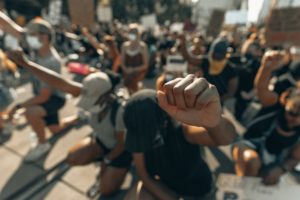Making New Black History and Elevating Humanism in Racial Justice
 Photo by Clay Banks on Unsplash
Photo by Clay Banks on Unsplash This article is the third in a series marking Black History Month that will include profiles of current and historical Black humanists and explorations of relevant issues.
For Black History Month in 2012, African Americans for Humanism (now defunct) launched a major marketing campaign. Featuring billboards and public transportation ads in seven major U.S. cities, the campaign focused on historic figures and modern-day individuals who have questioned religion.
Ten years later, in 2022, Black atheist/humanist/freethinking voices are now more publicly acknowledged. And this is in no small part due to the work of organizations like Black Nonbelievers and Black Skeptics, who have broken barriers with features in major media publications (including this one with the “Five Fierce Humanists” cover story in 2018) and events like the Women of Color Beyond Belief conference.
My organization, Black Nonbelievers (BN), has particularly focused on increasing the presence of atheists and religion-doubters in Black communities, as well as providing much needed support and empowerment. We also prominently highlight Blacks who, historically, have either never believed or have shed their religious identities over time. It is important to acknowledge and educate others about these iconic figures, who have contributed much to our country’s framework yet had little to no belief whatsoever.
While the overall number of “nones” is rising, research shows that approximately 79 percent of the Black population still place belief at the center of their lives. Therefore, support for Black atheists, humanists, agnostics, and religion doubters is very much needed. While the general nonreligious demographic is on the rise in the U.S., the numbers in Black communities are significantly lower in comparison. The Black Nonreligious Americans report, released jointly with American Atheists in October of 2021, details higher levels of concealment and depression among us and highlights the unique challenges we face.
In addition, the voices of the nonreligious in the Black community continue to be largely overlooked in the fight for racial justice. While we are uniquely qualified to address how racial, reproductive, and economic injustices intersect with religiosity, we have not been afforded the same opportunities and resources. This further increases the sense of isolation that many already experience when leaving religion and makes it more difficult for those who are seeking community.
As anti-racism becomes a focal point, it is important to discuss how something as foundational as faith could be predisposing Black communities to more misinformation and oppression, and for longer periods of time. We can acknowledge the positive role that the church and religion have played, especially during extremely tumultuous times, while also offering valid critiques of the institution and its negative impacts.
On January 22, 2022, in collaboration with the Pittsburgh Freethought Community, BN presented “The Black Nonreligious Fight for Racial Justice” panel for the annual Pittsburgh Racial Justice Summit. Along with my colleagues Chris Cameron, author of Black Freethinkers: A History of African American Secularism, and Dr. Sabrina Dent, President of the newly founded Center for Faith, Justice, and Reconciliation, the panel highlighted the history of Black humanism in racial justice movements, the work of Black Nonbelievers, and how religious freedom work is crucial for anti-racism.
We are also contributing to modern-day Black History. The National Museum for African American Culture now has included the nonreligious perspective in their “gOD-Talk” series, and BN members will be featured in an upcoming documentary on the oral history of Black religious perspectives. We have also donated material for their archives and research, which is sure to reshape the historical narrative and better represent the nonreligious in Black communities.
So, as we celebrate Black History Month in 2022, let us also celebrate these very important strides for humanism. Our voices matter and, while we still have much work ahead of us, we are seeing some monumental changes in the years after the African Americans for Humanism campaign. Education helps to improve strategies, and places us all on the right side of history.
